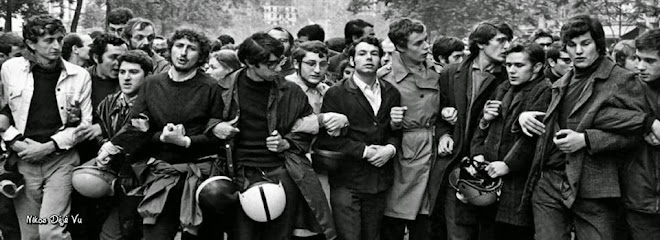5/5/2010 - Greek Crisis: Clashes Turn Deadly as Thousands Protest Against CutsGreek protests turned deadly on Wednesday as three died in an Athens bank set alight while tens of thousands demonstrated against harsh new spending cuts aimed at saving Greece from bankruptcy.
Three dead as Greece protest turns violent
At least three people have been killed in the Greek capital as protesters set fire to a bank during a general strike over planned austerity measures.
The bodies were found inside the Marfin Bank in Athens. The Greek prime minister said it was a "murderous act".
The protest became violent, with petrol bombs thrown at police who responded with pepper spray and tear gas.
Protesters are angered by spending cuts and tax rises planned in return for a 110bn euro (£95bn) bail-out for reece.
A police spokesman said the three victims - two women and a man - were among 20 people working in the Marfin bank branch on Stadiou Avenue in central Athens when the petrol bomb was thrown.
Most of the employees managed to escape the fumes as the flames took hold, but the three found their way blocked as they tried to escape to the roof and they suffocated.
"We took 15 minutes to get to the site because it was very difficult to get there," fire brigade spokesman Panayiotis Falaras.
He said another five people were rescued from the building's balcony.
Parliament is to vote on the measures by the end of the week. They include wage freezes, pension cuts and tax rises. They aim to achieve fresh budget cuts of 30bn euros over three years, with the goal of cutting Greece's public deficit to less than 3% of GDP by 2014. It currently stands at 13.6%.
As the demonstration gained momentum, a group of protesters rushed up a flight of steps at the parliament building in Syntagma Square, taunting MPs to come out and calling them "thieves".
Riot police forced them back, but right next to parliament, other groups set buildings on fire - including a department of the finance ministry in charge of the the austerity programme as well as an office of the Athens prefecture.
Prime Minister George Papandreou told MPs in parliament: "Nobody has the right to violence and particularly violence that leads to murder. Violence breeds violence."
But one of the protesters told the BBC it had been the fault of the police, whose "brutality" had led to the escalation.
"It's something tragic but I think that the responsibility in the last instance lies with the government because the government unleashed a tremendous amount of police violence against a huge demonstration," Panayotis Sotiris said.
The Greek protesters' ire is aimed against symbols of capitalism, says the BBC's Malcolm Brabant in Athens.
Our correspondent says it is not clear whether shock over the deaths will have the effect of diminishing the protests - but the fear is that the campaign to defeat the government will escalate.
World concern
The general strike is the third to hit Greece in as many months.
Flights in and out of Greece stopped at midnight, and trains and ferries were not running. Schools, hospitals, and many offices are shut.
The government has appealed to demoralised staff in the military, police, schools and hospitals not to retire, fearing the surge in demand for benefits could further drain treasury resources.
Meanwhile, the German parliament has begun considering the bail-out plan for Greece.Chancellor Angela Merkel urged MPs to back the emergency loan package agreed by European finance ministers at the weekend.
It requires Germany to pay the largest proportion of the loans.
"Quite simply, Europe's future is at stake," she said.
The EU has agreed to provide 80bn euros (£69bn) in funding - of which around 22bn euros would come from Germany - while the rest will come from the International Monetary Fund (IMF).
European Council President Herman van Rompuy said the European Union was watching events in Greece.
"We are all concerned by the Greek economic and budgetary situation but at this moment our thoughts are with the human victims in Athens," Mr van Rompuy said
"A major programme has just been finalised. This programme is ambitious and credible in efforts that it represents towards the budgetary plan and competitiveness."
The bail-out deal is designed to prevent Greece from defaulting on its massive debt.
However, it must first be approved by some parliaments in the 15 other eurozone countries.



No comments:
Post a Comment